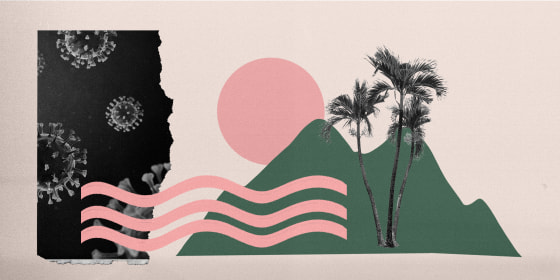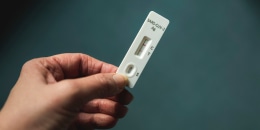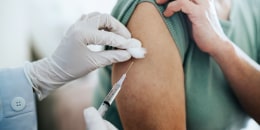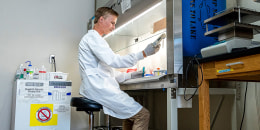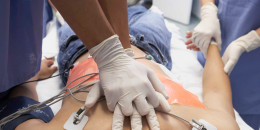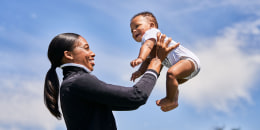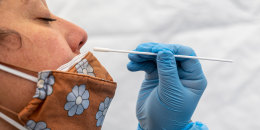As temperatures rise, more people are looking for ways to beat the heat — and that includes a trip to the beach.
TODAY spoke to two experts, who weighed in on whether beach trips are safe, what information you need to know before you go, and what conditions you should keep in mind when you're there.
1. Is going to the beach considered safe?
Much like other outdoor activities, going to the beach is considered low-risk, so long as some precautions are taken.
"The important thing to remember is outside activities are going to be lower risk than indoor activities," said Keri Althoff, Ph.D., an associate professor of epidemiology at the Johns Hopkins Bloomberg School of Public Health in Baltimore, Maryland. "But when you're at the beach, if it's overly crowed, if people are not wearing masks and they're too close together, there's reason to be concerned. Risk levels would obviously be going up."
Ashwin Vasan, Ph.D., an assistant professor of clinical population and family health and medicine at Columbia University's Mailman School of Public Health, agreed that the risk is generally low, and said that the physical and mental health benefits of getting outside may outweigh the potential risk.
"Getting outdoors and trying to engage in as many normal activities as possible is good for us," he explained. "It's good for us to try to maintain whatever connections we can to (have) a semblance of a normal life — understanding that we're nowhere near a normal life. But the what I would say is that people should do that, but just do so safely do so understanding all the risks, do so in an informed way, in a safe way."
Both said a major factor in making sure the trip was safe was knowing what the spread of the coronavirus was in the area you were visiting.

"You have to look at local conditions, and what the prevailing circulation of the viruses in the community is, " Vasan said. "In a place like Florida, in a place like Georgia ... I would stay home, staying home is the safest thing you can do. But in a place like New York or in Michigan or places that have seemed to have tamp down on the virus, it's probably a reasonable thing to go to the beach safely if you can adhere to social distancing."
Watch TODAY All Day! Get the best news, information and inspiration from TODAY, all day long.
2. What should I know in advance?
Althoff recommends taking some time to "do your homework" before heading to the beach for the day.
"You need to know: Is the beach open, is it open just for sunbathing, is it open for swimming, are there going to be lifeguards there?" she said. "Those are good, basic water safety things that everybody needs to be thinking about. ... It's unfortunate to see families and people end up at the beach and then they're disappointed there's no swimming or sunbathing and you have to keep moving, so do your homework and plan a head a little bit."
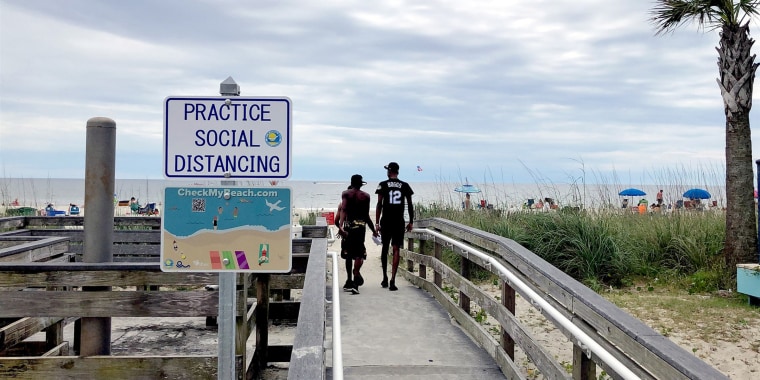
Althoff also said to make sure you know the specific beach's requirement for wearing masks and social distancing, since different localities may have their own rules and regulations.
"It's good to know what the expectation is when you're in that space," she said.
Vasan also said to make sure you know what the capacity limits are at the beach you plan to visit, and make sure you arrive early enough to be admitted.
Althoff said that even before you get to the beach, you should be thinking about your coronavirus exposure while getting there. If you are traveling by personal vehicle, that's "obviously pretty low-risk," but using public transit may expose you to more risk.
3. Do I still need to social distance?
Even though outdoor activities are safer than their indoor counterparts, it's still important to keep at least six feet of distance between yourselves and others.
"I think six feet is a minimum," said Vasan. "...We know that the risk of transmission decreases after six feet. I would say to anyone going to the beach, you should set a minimum of six feet, but ideally more."
That distancing should apply to all aspects of the beach — keep your distance in parking lots, boardwalks, and even in the water.
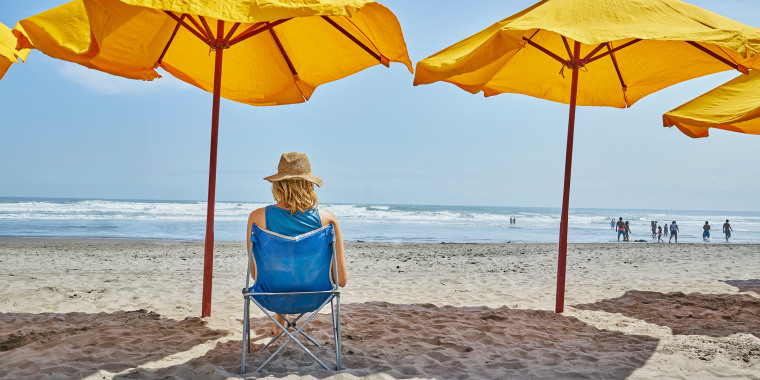
"If you see a bunch of people in the water in front of you try to find another spot where there's fewer people," Vasan advised.
If you can't social distance in some spaces, be sure to have a mask on hand so you can put it on. However, masks should never be worn in the water.
"If the beach is crowded, and you want to get out of there, put your mask on to walk out of there," Althoff said. "If you're going in and out of a parking lot, and you're not sure you can keep six feet of space around you, bring your mask, you can pop it on. When you go into the water, leave the mask on your towel, but just make sure you have one with you."
4. Is it OK to go with friends?
As some states begin to lift their tight quarantine restrictions, the idea of "quarantine bubbles" has come up. If you've been participating in one of these bubbles with family or friends, it's OK to go to the beach together, but you should still be cautious.

"I would say 10 or fewer is a really good rule of thumb to use," said Althoff. "If you're going to be close to someone, like less than six feet, that should be a very small network of people ... Ideally, you're only hanging out with each other and you're all being very honest about your exposures."
Althoff also said that it's possible to do a socially-distanced trip, but advises that it could take some significant willpower and pre-planning to make sure you keep six feet of distance between your group and your friends and make sure that there aren't objects passed between groups.
Get more tips for a better summer in our Summer Safety Guide
5. What should I do about enclosed spaces?
Treat enclosed spaces, like snack bars and restrooms, the same way you would treat any other public space.
"It's like any other place," said Vasan. "If you're going to go outside to dine, or if you're going to go use a public restroom, you should be wearing a mask. And you should be socially distancing. That'll just keep you safe."
